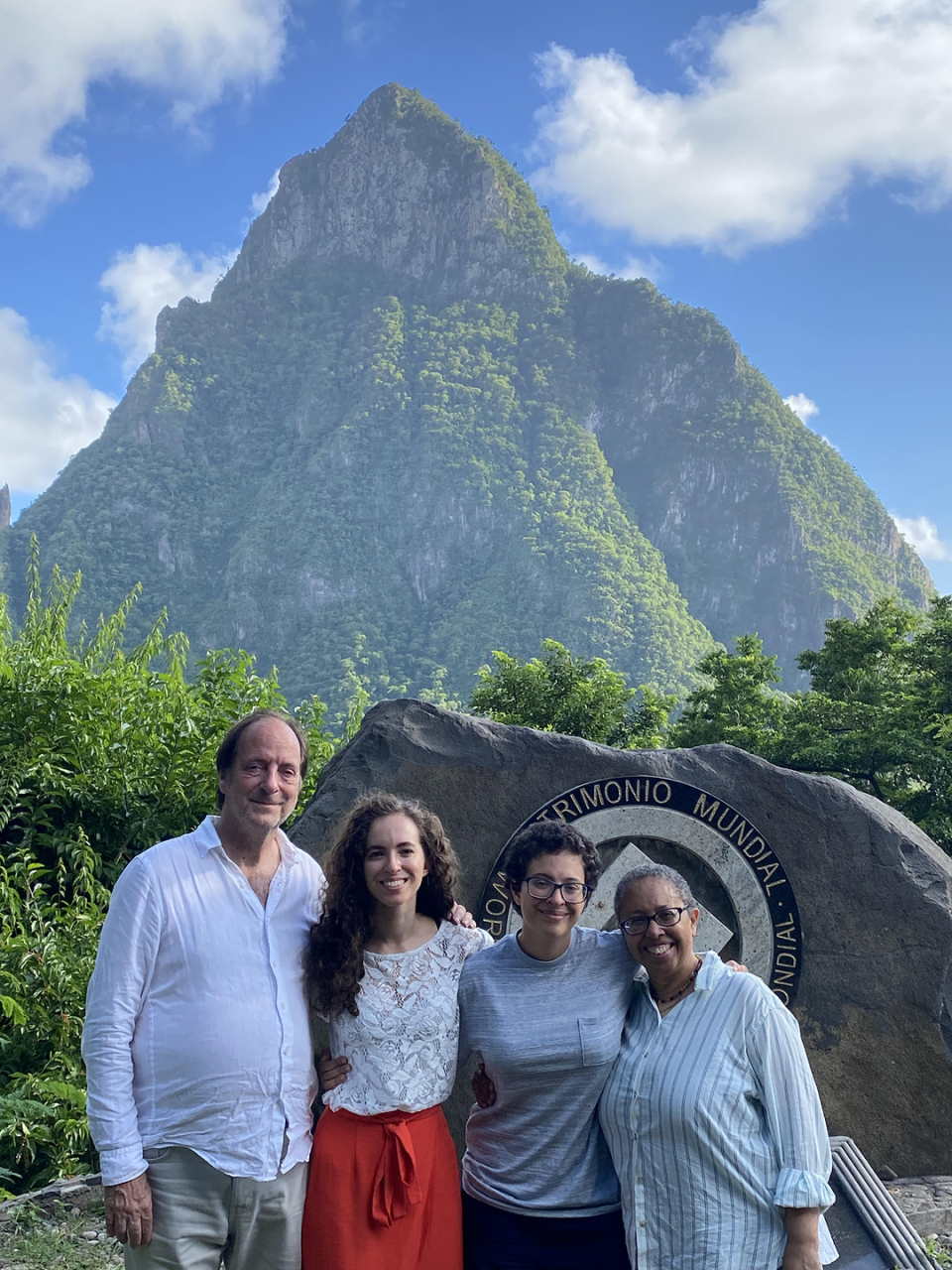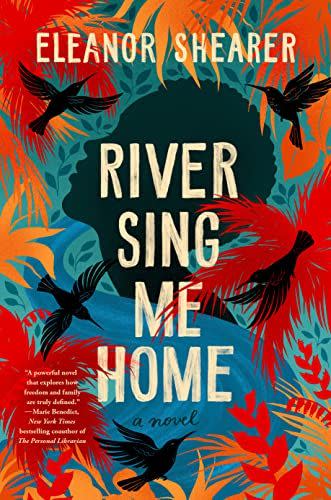I'm Half Black, and Passing as White Has a Complicated History

"Hearst Magazines and Yahoo may earn commission or revenue on some items through the links below."

The white boy at the house-party — my first at a new school — looked me over. Eyes slightly narrowed, an appraising gaze.
“You know,” he said. “I’m pretty sure you’re making up this whole Black mum thing.”
I don’t remember what I said to him. Probably, desperate to fit in, I just laughed nervously into my drink. But I will always remember his words.
My mother’s parents came to the United Kingdom from St. Lucia in 1957, finding a motherland as cold and grey as the fog and rain that surrounded them as they landed. They brought with them African, indigenous Caribbean and white creole roots. On my father’s side are Australian settlers and British shipbuilders, the other side of colonialism. And from my parents’ union, I emerged looking white — as have so many of mixed ancestry over the years. Throughout history, some of those like me have chosen to “pass” as white, concealing their racial origins.
The word “passing” evokes a sense of something fleeting and temporary, and for many, it was. Theirs was the passing in and out of races regularly; known in some quarters as Black but slipping into whiteness when entering a shop or sitting next to a stranger on a train.
But “passing” also refers to death. For some, to pass was a kind of death – a severing of all social and familial ties so that you could pass from one world to the other for good. This was not the thrill of temporarily tricking a stranger. This was the pain of never seeing your family again, in order to keep up a convincing lie.

Gone are the days when someone who looks like me might live in constant fear of discovery, of the moment when someone would unmask us as “really” Black. However, some people – mostly white people – still want to determine what I “really” am, rather than letting me decide that for myself. Their suspicion of my racial identity implies that, because of how I look, it is wrong for me to embrace my Caribbean heritage. I have been accused of being “a bit fake” for identifying as mixed race, as if the color of my skin disqualifies me from doing so.
At some point in the last hundred years, people who pass have achieved the impossible. We have been welcomed into whiteness.
My heritage is more than the color of my skin
Race has always been a crude and imperfect metaphor. It is a mix of what you look like and where you come from: your family, ancestry and community. A century or two ago, blood trumped appearance. Infamous “one drop” rules meant that even a distant Black ancestor could make you legally Black yourself. It is a good thing that we have left such ridiculous notions of race behind. But I can’t help but feel some white people, who treat me as if my appearance should disqualify me from identifying as anything other than white, have just exchanged one rigid concept of race for another.
As awareness of racial injustice has increased, I think many white people, for well-meaning reasons, see race as purely about the negative treatment people receive based on the color of their skin. It is absolutely true that oppression and discrimination continue to be an overwhelming presence in so many people’s lives. It is also true that, because of the way that I look, I am largely shielded from it.
But to me, identifying as mixed race is not about trying to claim a kind of oppression for myself. It is about pride in my heritage. It is about the joy that I take from being part of the Caribbean diaspora, and the Black diaspora more broadly. I can’t help but wonder if the reason so many white people seem confused by my choice not to identify as white is because they cannot see being Black as anything other than suffering. In some ways, they are still living with the old idea of passing, where people would sacrifice so much just for the chance to pretend to be white. Now that I am being offered that chance, I choose instead to embrace all parts of myself.
Passing has affected my family through generations
I am not the first in my family to pass. My grandmother, born in the village of Canaries St. Lucia in 1934, was the fairest of six daughters. Her skin marked her out for a future of slowly climbing the island’s social ladder: she was to be a seamstress and a companion to her aunt, a woman who also passed for white. From there, she could dream of children even fairer than she was, that much closer to the island’s colonial elite.

But then, she met and fell in love with my grandfather, a dark-skinned man from Barbados. Her family did not approve, so they eloped to England in 1957. In England, my grandmother’s appearance shielded her from some forms of racism, but with my grandfather at her side, she faced her fair share of prejudice. People spat at them in the streets, assuming that she was a white woman with a Black man.
Her children – my mother and two aunts – were visibly Black. My mother remembers times when, on the bus, the children would sit together with their mother behind them. White women would shoot my mother and her sisters dirty looks and try to conspiratorially pull my grandmother into whispered conversations about how much they despised all these new Black migrants from the Caribbean. My grandmother would sit and say nothing until the bus arrived at her stop, when she would simply rise and let the children follow her out, leaving these women gawping in her wake.
We often joke it is a family curse, the way people refuse to see us as mothers and daughters just because of skin tone. No matter that our voices and our laughs sound the same or our mouths and noses are similar shapes. I once brought a friend home after school, and my mum popped her head in to say a quick hello. When she was gone, my friend turned to me and asked, “Is that your cleaner?”
We joke about it, but it’s not funny at all. It’s a pattern, throughout history, of white people trying to define the family we are and are not allowed to have, based on crude definitions of race. And we are tired of it.
Today, I’m proud of my heritage
For my grandparents, seeing my mother and her sisters succeeding in predominantly white spaces like elite universities was a source of great pride. My grandparents did not think of their Caribbean identity as something worth preserving and racism only reinforced this impression.
These attitudes left their mark on my mother and then, in turn, on me. I grew up with a sense that there was something that made my mother’s family different from my father’s, but without much tangible connection to it. In my house, we cooked spaghetti Bolognese, fish fingers and chips, and cottage pie, not jerk chicken, breadfruit or saltfish.
My grandmother died when she was only 56, four years before I was born. The loss was devastating for the family, but particularly my grandfather. The plan had always been to retire together back to St Lucia. Without her, that plan could never come to be.
But then my grandfather met his second wife, my step-grandmother. He was visiting an old people’s home where she worked as a nurse, and he recognized something about her face. She was from St Lucia; my grandfather had worked with her brothers on the island, and had saved one of them from destitution after insisting he be kept on at the sugar refinery after he lost an arm. And her sister, who died tragically young in her teens, was my grandfather’s first love. She was a new way back to the island he had left decades ago. They bought a house together there and he finally made his return.
My grandfather passed away when I was 16, but my family managed to visit him once in St Lucia before he died. That trip, over Christmas in 2008 when I was 12 years old, started me on a journey of rediscovering our family’s roots. Everywhere we went, rather than facing the stares or hostility he was used to in England in the 1950s and 1960s, people seemed to know him and be glad to see him.

Later, after my grandfather’s death, my mother said that in the Caribbean, she felt like roles were reversed. In the UK, when she walks into a room full of white people, they wonder why she is there – until they see my father and they understand she is there with him. In the Caribbean, when we walk around as a family, it is only when people see my mother that they realize we might not just be tourists. On that trip with my grandfather, it must have been nice for him to be able to welcome us into belonging, rather than the other way around.
The more I learned about history, the more I wanted to know

River Sing Me Home
$24.30
amazon.com
BerkleyAfter that trip, my interest in my Caribbean heritage only grew. I eagerly searched for more information on our history, filling in the gaps left by school lessons where slavery on the islands came up only in passing as something bad that was heroically ended by white people.
The year my grandfather died, I went to an exhibition called Making Freedom that focused on the ways enslaved people in the Caribbean were the agents of their own liberation. This exhibition spoke of brave women who, after emancipation, travelled across the Caribbean trying to find the children who had been taken from them and sold to different plantations. This incredible detail planted the seeds for what would become my debut novel, River Sing Me Home. Writing it became another way to bring me closer to my roots.
If I am ever “recognized” in public as mixed race, it tends to be by Afro-Caribbean people. At the supermarket checkout one day, a middle-aged Black woman smiled at me and told me I looked just like her daughter. And in St Lucia, a security guard guessed my heritage, before calling over a colleague – who turned out to be a cousin of mine, though our respective branches of the family had lost touch. The first guard nodded, satisfied.
“You have the same face,” he said, looking beyond skin to see the shape our noses and the curve of our mouths.
It made my heart swell. My identity is more than what others notice in me, but it can still be powerful to be seen – to be recognized as part of a community. My grandfather is gone now. One day, my mother will be too. Sometimes, I worry that without them, I will lose my link to the Caribbean and my claim to my heritage. You’re making up this Black mum thing, people will say, and what will I have to disprove them? But these little moments of recognition are a reminder that I am my own link to it all. They are a reminder that I belong.
Eleanor Shearer's new book, River Sing Me Home, is now available from your favorite bookseller. This essay is part of a series highlighting the Good Housekeeping Book Club — you can join the conversation and check out more of our favorite book recommendations.
You Might Also Like

